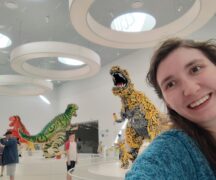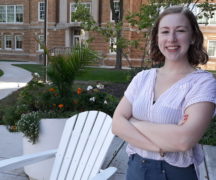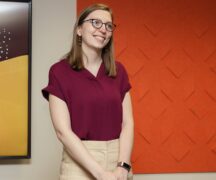By DAVID DUPONT
BG Independent News
Quinn Eberhard understood bioinformatics was a field she was interested in exploring when she heard a professor speak about it and she didn’t understand what he was saying.
Eberhard, a junior in Bowling Green State University’s Honors College, was in her freshman year and was majoring in forensic science when she attended a chemistry club research meeting where several professors explained their work.
“I wanted to branch out and see what else there was in chemistry,” Eberhard said in a recent telephone interview from her family’s home in Dublin where she’s staying during the pandemic.
“Dr. (Neocles) Leontis started talking about bioinformatics and he’s using these words I’d never heard before,” she recalls. She said she’d been able to follow all the other talks, but not his. But the work sounded important. “All I knew was I wanted to do something very different from what I was currently doing.”
So, Eberhard approached Leontis and admitted her confusion, but said she was interested in bioinformatics.
He told her to show up with a laptop on Wednesday, and they’d get started.
Though she’s done research in a number of fields, “this is the only research I’ve done consistently for three years. This is the most meaningful for me. I’ve seen myself grow a lot. This is where I plan on sticking.”
She plans on pursuing a doctorate in bioinformatics.
Bioinformatics brings together biology, statistics, and computer science. That’s “very much outside the box” for someone whose background and interest was in chemistry.
Now it’s become Eberhard’s passion.
Her nascent career got a boost earlier this year when she received the prestigious Barry Goldwater scholarship, which is considered the preeminent undergraduate award of its type in the fields of natural sciences, engineering and mathematics. Eberhard is the first BGSU student in more than a decade to win the award. This comes after she was named a BGSU Hoskins Global Scholar.
The Goldwater scholarship came as a result of her work with Leontis and Craig Zirbel, a professor of mathematics and statistics. When Eberhard started working in Leontis’ lab, they were studying how RNA and proteins interact in the body.
This is essential for a whole range of research, including research into cancer, diabetes and viruses including the coronaviruses.
But to study them, researchers must create three-dimensional models. That’s a painstaking process. They crystalize the structures so they can look at them in three-dimensions and understand what they look like.
But that analysis, she said, is very time consuming and very expensive. “Sometimes is practically impossible to do.”
That’s what Eberhard was doing in the lab. “I decided this is the worst. I need to do something because no one should have to be doing this over and over again.”
So, she worked on developing an algorithm. “It’s a precise order the computer goes through logically to solve a problem instead of scientists having to go through manually.”
The algorithm runs the calculations for the models based on previous models for other species. What took Eberhard six months to do, can then be done in a matter of minutes.
Unlike other mathematical tools, this one is able to look at RNA and proteins and model both in the same space. “That’s the most revolutionary part of this, and to be able to do it for such a large number of species at once.”
They hope to develop a web server so scientist can plug their requests and get their results.
“That’s what I like about this field,” she said. “You can develop a tool and you never know what someone will do with it. People in all kinds of fields interested in RNA and protein interactions can utilize this.”
The Hoskins award allowed her to travel to Cambridge, England, where she worked with researchers at the European Molecular Biology Laboratory – European Bioinformatics Institute.
She’d hoped to return for further study, but that’s not possible at this point because of the pandemic.
She’s continuing her work remotely, and completing her classwork in physics, microbiology, genomics, and genetics. As daunting as that sounds, she’s unfazed. It’s all interconnected, she pointed out.
Eberhard graduated from Dublin Coffman High School where she started studying chemistry as a sophomore, and then was able to concentrate on it during her junior and senior years through the school International Baccalaureate program.
She was drawn to BGSU because of its forensics program. She knew that if she decided to divert away from forensics, she’d still receive a chemistry degree. BGSU also offered the most generous financial aid package. Then friend committed to attending. With her roommate arrangement figured out, she decided to come to Bowling Green. “Everything just kind of came together.”
Eberhard enrolled in the Honors College. “The Honors College is a focused on making sure you’re always expanding your boundaries and thinking outside the box,” she said.
The critical thinking that’s emphasized is central to research, and helped her to take on the challenges of studying bioinformatics where she found “a sense of belonging.”
She credits Simon Morgan-Russell, dean of the Honors College, with his help along the way.
Eberhard has earned plaudits from faculty.
In a BGSU press release announcing her Goldwater scholarship, Leontis stated: “Her experiences drive her to seek real-world applications for everything she learns in science classes and in her research work. She recognizes the value of bioinformatics and computational approaches to solving complex problems involving genetic conditions that occur in humans and is committed to work at the forefront of such challenges in her scientific work.”
Zirbel was quoted as saying: “Quinn is a superb choice for the Goldwater Foundation Scholarship because she is smart, fearless and highly motivated. She works hard toward her goals and is capable of setting her own direction, but she also takes suggestions very well. She also had a good proposal and the right environment in which to pursue it. She shows every sign of being on the trajectory toward becoming a successful research scientist, and of simply having the right nature to do so.”
This semester she had only one lab in physics, which lent itself to being done virtually. How the labs will be handled if BGSU has to continue online instruction only in the fall is a big question.
Whatever the decision, she trusts the administration.
Still, she said, “I definitely hoping we will be back.”





